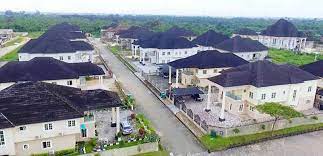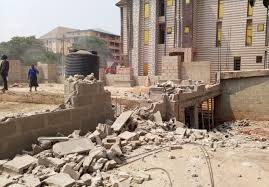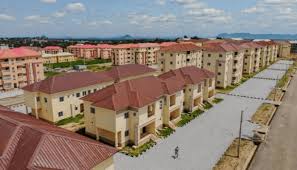
Government should deploy pension fund into real estate sector, says Ejidiran
Mr. Yemi Ejidiran is a quantity surveyor and Managing Director, Wemabod Limited. He spoke with CHINEDUM UWAEGBULAM on the real estate sector, especially decline in rents for high-rise office structures in Lagos Island, prospects of the retail sector and plans for Southwest region.
With the downturn in the economy caused by COVID-19 pandemic and lately rise in foreign exchange rate, the real estate appears worst hit. How has this affected housing in Southwest states. What are your plans and solutions?
There is no gain saying the fact that COVID-19 pandemic has affected businesses worldwide on general basis, but the real estate sector is badly affected. In any economic downturn, the priority of humans is not housing but ability to eat, fend for clothing and other essential things.
Housing has been pushed to the background by virtue of the fact that the disposable income of the general public has been greatly hampered by the COVID-19. You will agree with me that COVID-19 has affected all sectors of the economy.
What that means is that inflow of revenues has been hampered, which affected people’s cash flow and spending power. With this reduction in earning power of the populace and rising cost of materials, we have decided to seek development funds from federal agencies.
The reality of the matter is that Lagos Island needs a gradual reurbanisation, especially Broad and Marina Streets. More often, most of the grade A offices that are newly developed in Ikoyi, Victoria island, bring more rental uptake that are relatively higher than those in Marina and Broad Streets. That is causing the differential in rental values.
But things are also changing on a gradual basis. This is because the infrastructure around Marina and Broad Streets are being upgraded and enhanced. The rail transit system is landing in Marina, that will bring a lot of foot traffic to Marina and Broad Streets. Chances are that investors would eventually begin to reposition their investments around this area because real estate works with mass transits and foot traffic.
It is also quite clear, with urban regeneration going on with modern and adequate infrastructure, jobs are being provided, while with road transportation uptake, Marina and Broad Streets will also come back.
The equilibrium in demand and supply of office space will always exist and more in different forms such as co-working and virtual space such as working from home needs to grow. The real deal that defines this is the flexibility in pricing and rent payments between Small and Medium-size Enterprises (SMEs) and corporate.
Most of the SMEs operators require a lot of flexibility in pricing for commercial real estate office space, as some are seeking daily, monthly, quarterly and half yearly rentals. That is gaining ground now because the option provides a lot of flexibility, those SMEs are at the backdrop of poor cash flow and it enables them to plan.
For multi-nationals and corporate, chances are that the corporate will retain their office space as dictated by the open market. The high cost of operation such as service charges will still be there. In terms of rentals, the SMEs will continue to demand for lower rentals and flexibility in payments and for services rendered.
The retail market is facing a huge challenge regarding rent payments, with shopping centres now becoming more flexible with their tenants. What is your thought about the retail market? Do you foresee the market having a greater degree of stability?
The retail market in Nigeria remains largely underdeveloped, given the country’s population. Nigeria is about 200 million and you can count on your fingertips, the number of shopping malls we have nationwide and retail outlets are still insufficient.
However, the growth of retail facilities has also been hampered by the spending power of the populace. It has become impossible to attract people, which has created a stunted growth for retail development in the country. There is still room for a well-developed model, once it is strategically developed and right kind of tenant mix is adopted.
Retail development is generally moving away from predominantly groceries to more of entertainment and may likely do well. Now, developers are also bringing in a lot of ideas to ensure they retain tenants in their malls. You see more of naira denominated rents against dollar denominated rentals.
In fact, developers are encouraging tenants to make quarterly rental payments as against yearly or three years rent. Tenants also have more options now, either to have cooling system only in the common areas or provide their own air-conditioners. I see a degree of stability in retail sector, if the right mix of tenants is adopted.
In Nigeria, providing affordable housing for low- income earners has remained a major challenge in the country. What should government do to encourage homeownership for this segment of the society?
Providing housing for the low-income earners has been a major challenge, as government needs to encourage developers to produce cheaper homes and with minimal stress along the vagaries associated with project life cycles. For example, government needs to make access to land easier than what we have presently.
If you buy land, if you assume that you have a title you will be deceiving yourself. Oftentimes, you still see omoniles come to sites despite the fact you have a title. Those issues are still there. And it creates a major problem for developers to access land. If the barrier to access land is removed, the provision of housing will be more efficient.
There is also need for better planning approval processes, as some of the processes are so cumbersome and create bottlenecks. In a situation you’re unable to secure planning approval for a period of one to nine months; it has a negative effect in home production. Currently, we have about 17 million shortfall in housing, which portends that things have to be done with the speed of light and efficiency, but what we have in the planning approval process don’t guarantee that.
It is also important for government to encourage research and local production of materials that tend to bring down construction costs. As you know, construction inputs in our economy today, is more of foreign exchange dependent.
However, if government can invest heavily in research, encourage manufacturing and local production of construction materials, chances are that construction costs will go down. It is also important for government to improve credit system to enable off-takers access mortgages, which will fast track the rate at which people can be able to buy homes. It is also important for government to ensure efficient mortgage financing. The present mortgage system is not sufficient, robust to capture the huge market that is available for home purchases.
Talking about mortgage, there were high expectations among Nigerians when the mortgage system was introduced. What are the problems with the mortgage sub-sector? How can it be resolved?
The summary of the issues surrounding the mortgage system has to do with costs. The Nigeria mortgage rate is about nine times higher than what is obtainable in other climes such as United Kingdom and United States. That’s where disposal income is much easier than what we have here. Again, there are high interest rates due to limited supply of loanable funds. At the back of high interest rate is the inflation rate.
In development space, with borrowing rate hovering around 18-22 per cent and inflation rate at 19 per cent, the cost has already increased to 13 per cent. There is no way citizens can access homes at that cost. Government should use its muzzle to drive funding into the mortgage system, even from the pension fund, and deploy it for mortgage and funding availability in the real estate sector.
It can also get involved in direct construction of houses and placing them under mortgage scheme and allow support from multinational agencies in the Nigeria Mortgage Refinancing Company. It is also important for government to strengthen the credit system in the profiling of off-takers.
Few years ago, your financial resources nose-dived following a series of fire incidents, litigations and apparent improper maintenance of facilities. What new strategies are you’re adopting to resurrect WEMABOD estates and manage your properties?
As you have observed, WEMABOD is bestowed with real estate assets and the company has been in existence since 1962. The challenge that the company faced recently based on its operations has to do with the need to optimize its real estate assets. However, as a matter of strategic imperatives, WEMABOD has carved a niche for itself. We now have an overall aspiration and have put the past behind us. Our aspiration is to be the flagship of the real estate providers, with exceptional customer service and profitability in our chosen sector.
ur strategic pillars were on portfolio optimization, as some of our properties are in stranger state, maximize revenue and earning capacity by enhancing quality standards of properties and upgrading facilities. We’re also investing heavily on renovations in some of this commercial and residential real estate, this is currently going on. You may have observed that in Western House, a lot is changing, and renovation is ongoing. This will be sustained in all commercial real estate in our portfolio. Currently, renovation work is going on in three other properties, while some have been completed in Ikoyi. Renovation works have also started in Investment and Awolowo Houses.
Source : The Guardian
Similar Topics
The Lagos State Government, through the Lagos State Physical Planning Permit Authority (LASPPPA),...
a month ago Read MoreThe Federal Government has expanded the Abuja-Kaduna-Kano Road project to incorporate a direct...
a month ago Read MoreThe Federal Capital Territory Administration (FCTA) has taken possession of Wadata Plaza, the...
a month ago Read MoreDefaulters on FCT ground rent now have 14 days grace to pay up what they owe the FCT Administration...
a month ago Read MoreUnprofessional practices by estate agents in major cities are significantly influencing the spike...
2 months ago Read MoreA Real estate development firm, Lifecard International Investment Company, has revealed that many...
2 months ago Read MoreDespite a fall in investment volumes from the 2021 peak, there is an ongoing desire for property...
2 months ago Read MoreThe Lagos State government has advised the leadership of the Nigerian Institution of Estate...
2 months ago Read MoreReal estate market dynamics such as construction cost, land, finance, government policies and taxes...
2 months ago Read MoreEvent Set to Celebrate Managers Who Shape Careers and Drive Organizational Growth Business...
4 months ago Read MoreGlobal Leaders to Converge in Lagos for Landmark Event Driving Urban Innovation and...
4 months ago Read MoreIn a bold move to redefine affordable luxury housing, Nigerian real estate giant Gtext Holdings has...
4 months ago Read MoreIndustry Experts Urge Anti-Corruption Measures, Innovative Financing to Address Crisis By: Oche...
4 months ago Read MoreLAGOS, NIGERIA – Global real estate consultancy Knight Frank and UK developer Mount Anvil...
4 months ago Read MoreBy Oche Onum Lagos, Nigeria As Nigeria’s real estate sector braces for 2025, rapid...
4 months ago Read MoreBy Oche Onum Abuja, Nigeria In a landmark move to combat climate vulnerabilities in urban...
4 months ago Read MoreLAGOS, NIGERIA The Federal Government announced plans Wednesday to establish a Real Estate...
5 months ago Read MoreAccording to The Guardian's investigation, 70% of Nigerian states rely on manual land...
5 months ago Read MoreWhat is the Initiative? The Federal Government of Nigeria has unveiled an N100 billion private...
5 months ago Read MoreAbuja, Nigeria’s gleaming administrative capital, has long symbolized hope for migrants...
5 months ago Read More














